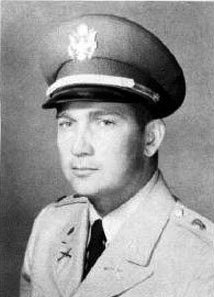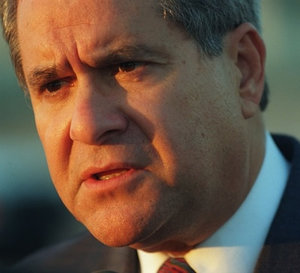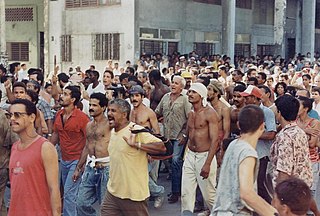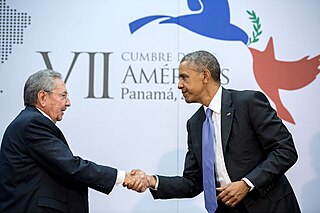The island of Cuba was inhabited by various Amerindian cultures prior to the arrival of the explorer Christopher Columbus in 1492. After his arrival, Spain conquered Cuba and appointed Spanish governors to rule in Havana. The administrators in Cuba were subject to the Viceroy of New Spain and the local authorities in Hispaniola. In 1762–63, Havana was briefly occupied by Britain, before being returned to Spain in exchange for Florida. A series of rebellions between 1868 and 1898, led by General Máximo Gómez, failed to end Spanish rule and claimed the lives of 49,000 Cuban guerrillas and 126,000 Spanish soldiers. However, the Spanish–American War resulted in a Spanish withdrawal from the island in 1898, and following three and a half years of subsequent US military rule, Cuba gained formal independence in 1902.

The Cuban Liberty and Democratic Solidarity (Libertad) Act of 1996, Pub. L.Tooltip Public Law 104–114 (text)(PDF), 110 Stat. 785, 22 U.S.C. §§ 6021–6091) is a United States federal law which strengthens and continues the United States embargo against Cuba. It extended the territorial application of the initial embargo to apply to foreign companies trading with Cuba, and penalized foreign companies allegedly "trafficking" in property formerly owned by U.S. citizens but confiscated by Cuba after the Cuban revolution. It also covers property formerly owned by Cubans who have since become U.S. citizens.

The United States embargo against Cuba prevents US businesses, and businesses organized under US law or majority-owned by US citizens, from conducting trade with Cuban interests. It is the most enduring trade embargo in modern history. The US first imposed an embargo on the sale of arms to Cuba on March 14, 1958, during the Fulgencio Batista regime. Again on October 19, 1960, almost two years after the Cuban Revolution had led to the deposition of the Batista regime, the U.S. placed an embargo on exports to Cuba except for food and medicine after Cuba nationalized the US-owned Cuban oil refineries without compensation. On February 7, 1962, the embargo was extended to include almost all exports. The United Nations General Assembly has passed a resolution every year since 1992 demanding the end of the US economic embargo on Cuba, with the US and Israel being the only nations to consistently vote against the resolutions.

The Cuban dissident movement is a political movement in Cuba whose aim is to replace the current government with a liberal democracy. According to Human Rights Watch, the Marxist-Leninist Cuban government represses nearly all forms of political dissent.

Luis Clemente Posada Carriles was a Cuban exile militant and Central Intelligence Agency (CIA) agent. He was considered a terrorist by the United States' Federal Bureau of Investigation (FBI) and the Government of Cuba, among others.
The Cuban American National Foundation is a foundation with the aim of assisting members of the Cuban community in Miami, Florida.
The Cuban–American lobby are various groups of Cuban exiles in the United States and their descendants who have historically influenced the United States' policy toward Cuba. In general usage, this refers to anti-Castro groups.
The Coordination of United Revolutionary Organizations was a militant group responsible for a number of terrorist activities directed at the Cuban government following the Cuban Revolution. The United States government provided them with extensive financial and logistical support throughout their existence. It was founded by a group that included Orlando Bosch and Luis Posada Carriles, both of whom worked with the CIA at various times, and was composed chiefly of Cuban exiles opposed to the Castro government. It was formed in 1976 as an umbrella group for a number of anti-Castro militant groups. Its activities included a number of bombings and assassinations, including the killing of human-rights activist Orlando Letelier in Washington, D.C., and the bombing of Cubana Flight 455 which killed 73 people.
The Cuban government operates a national health system and assumes fiscal and administrative responsibility for the health care of all its citizens. All healthcare in Cuba is free to Cuban residents, although challenges include low salaries for doctors, poor facilities, poor provision of equipment, and the frequent absence of essential drugs. There are no private hospitals or clinics as all health services are government-run. The current public health minister of Cuba is José Angel Portal Miranda.

Cuba and the United States restored diplomatic relations on July 20, 2015, after relations had been severed in 1961 during the Cold War. U.S. diplomatic representation in Cuba is handled by the United States Embassy in Havana, and there is a similar Cuban Embassy in Washington, D.C. The United States, however, continues to maintain its commercial, economic, and financial embargo, making it illegal for U.S. corporations to do business with Cuba.

Jorge Lincoln Mas Canosa was a Cuban-American businessman who founded the Cuban American National Foundation and MasTec, a publicly traded company. Regarded within the United States as a powerful lobbyist on Cuban and anti-Castro political positions, he was labeled a "counterrevolutionary" by the Cuban Communist Party.

Relations between Cuba and Venezuela were established in 1902. The relationship deteriorated in the 1960s and Venezuela broke relations in late 1961 following the Betancourt Doctrine policy of not having ties with governments that had come to power by non-electoral means. A destabilizing factor was the Cuban support for the antigovernment guerrilla force that operates in remote rural areas. Venezuela broke off relations with Cuba after the Machurucuto invasion in 1967, when Cuban trained guerrillas landed in Venezuela seeking to recruit guerrillas and overthrow the government of Raúl Leoni. Relations were reestablished in 1974.
José Antonio Llama was a director on the executive board of the Cuban American National Foundation (CANF). Llama also participated in the Bay of Pigs Invasion.
Ninoska Pérez Castellón is a prominent member of the Cuban exile community in Miami, and outspoken opponent of Fidel and Raul Castro. In relation to this mission of hers, she was one of the founding members of the Cuban Liberty Council with her husband Roberto Martin Perez.
Freedom to Travel to Cuba Act is the name of three bills introduced into the United States Congress which would allow U.S. citizens to engage in unrestricted travel to Cuba for the first time since 1963.

The Maleconazo was a protest on 5 August 1994, in which thousands of Cubans took to the streets around the Malecón in Havana to demand freedom and express frustration with the government. Following the collapse of the Soviet Union in the early 1990s, Cuba fell into a crippling economic crisis that had many citizens looking to flee the island. On the day of the protest, the Cuban police blocked people from boarding tugboats leaving Havana, prompting thousands of citizens to storm the streets in the largest anti-government demonstration Cuba had seen since the Cuban Revolution. In the following weeks, President Fidel Castro quelled the frustration by opening the doors of the country and allowing Cubans to leave, which had a significant impact on Cuba's relationship with the United States moving forward.

The Canada–Cuba relations are the bilateral relations between Canada and Cuba. Informal trade relations between the colonies of Atlantic Canada and the Captaincy General of Cuba have existed since the 18th century. The informal trading relationship between Canada and Cuba continued into the 20th century, with diplomatic relations formally established between the two countries in 1945.
The Cuban Assets Control Regulations, (CACR) 31 CFR 515, generally regulate relations between Cuba and the U.S. and are the main mechanism of domestic enforcement of the United States embargo against Cuba.

The Cuban thaw was the normalization of Cuba–United States relations that began in December 2014 ending a 54-year stretch of hostility between the nations. In March 2016, Barack Obama became the first U.S. president to visit Cuba since Calvin Coolidge in 1928. The normalization of relations between the United States and Cuba was relatively short lived, with much of the diplomatic progress that was made later being undone by the Trump administration.

María Elvira Salazar is an American journalist, author, and politician serving as the U.S. representative for Florida's 27th congressional district. She is a Republican assistant whip. Before entering politics, Salazar worked for the Spanish-language network Telemundo for three decades after serving as a news anchor for Miami-based WSBS TV. She has also worked for CNN Español and Univision.












